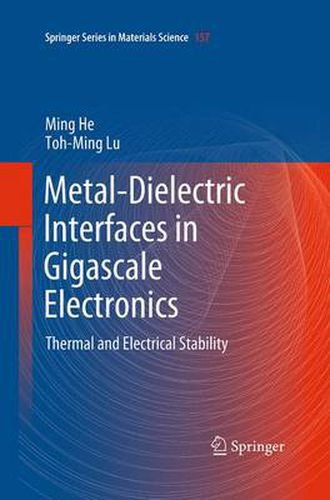Readings Newsletter
Become a Readings Member to make your shopping experience even easier.
Sign in or sign up for free!
You’re not far away from qualifying for FREE standard shipping within Australia
You’ve qualified for FREE standard shipping within Australia
The cart is loading…






This title is printed to order. This book may have been self-published. If so, we cannot guarantee the quality of the content. In the main most books will have gone through the editing process however some may not. We therefore suggest that you be aware of this before ordering this book. If in doubt check either the author or publisher’s details as we are unable to accept any returns unless they are faulty. Please contact us if you have any questions.
Metal-dielectric interfaces are ubiquitous in modern electronics. As advanced gigascale electronic devices continue to shrink, the stability of these interfaces is becoming an increasingly important issue that has a profound impact on the operational reliability of these devices. In this book, the authors present the basic science underlying the thermal and electrical stability of metal-dielectric interfaces and its relationship to the operation of advanced interconnect systems in gigascale electronics. Interface phenomena, including chemical reactions between metals and dielectrics, metallic-atom diffusion, and ion drift, are discussed based on fundamental physical and chemical principles. Schematic diagrams are provided throughout the book to illustrate interface phenomena and the principles that govern them.
Metal-Dielectric Interfaces in Gigascale Electronics provides a unifying approach to the diverse and sometimes contradictory test results that are reported in the literature on metal-dielectric interfaces. The goal is to provide readers with a clear account of the relationship between interface science and its applications in interconnect structures. The material presented here will also be of interest to those engaged in field-effect transistor and memristor device research, as well as university researchers and industrial scientists working in the areas of electronic materials processing, semiconductor manufacturing, memory chips, and IC design.
$9.00 standard shipping within Australia
FREE standard shipping within Australia for orders over $100.00
Express & International shipping calculated at checkout
Stock availability can be subject to change without notice. We recommend calling the shop or contacting our online team to check availability of low stock items. Please see our Shopping Online page for more details.
This title is printed to order. This book may have been self-published. If so, we cannot guarantee the quality of the content. In the main most books will have gone through the editing process however some may not. We therefore suggest that you be aware of this before ordering this book. If in doubt check either the author or publisher’s details as we are unable to accept any returns unless they are faulty. Please contact us if you have any questions.
Metal-dielectric interfaces are ubiquitous in modern electronics. As advanced gigascale electronic devices continue to shrink, the stability of these interfaces is becoming an increasingly important issue that has a profound impact on the operational reliability of these devices. In this book, the authors present the basic science underlying the thermal and electrical stability of metal-dielectric interfaces and its relationship to the operation of advanced interconnect systems in gigascale electronics. Interface phenomena, including chemical reactions between metals and dielectrics, metallic-atom diffusion, and ion drift, are discussed based on fundamental physical and chemical principles. Schematic diagrams are provided throughout the book to illustrate interface phenomena and the principles that govern them.
Metal-Dielectric Interfaces in Gigascale Electronics provides a unifying approach to the diverse and sometimes contradictory test results that are reported in the literature on metal-dielectric interfaces. The goal is to provide readers with a clear account of the relationship between interface science and its applications in interconnect structures. The material presented here will also be of interest to those engaged in field-effect transistor and memristor device research, as well as university researchers and industrial scientists working in the areas of electronic materials processing, semiconductor manufacturing, memory chips, and IC design.